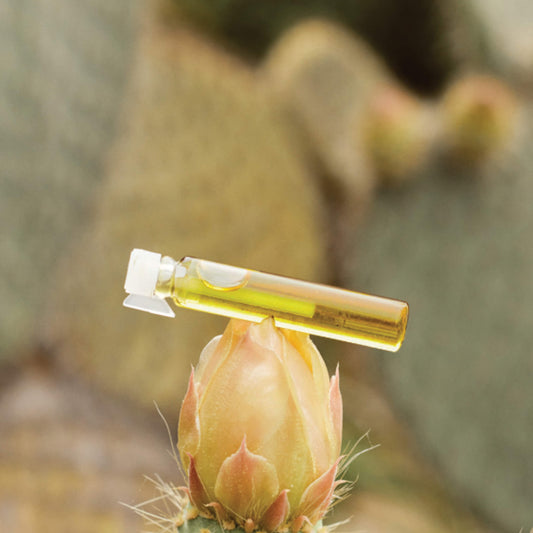
Neroli essential oil
Neroli essential oil is an antispasmodic, nervous system balancer, harmonising, antidepressant, antiseptic, skin tonic, sedative, bactericide and liver stimulant.
Neroli oil or bitter orange flower oil
Neroli, also known as orange blossom or Seville orange, comes from the flower of the bitter orange tree, a tree native to Asia. The bitter orange tree is found notably in France, Italy, Egypt, and Morocco. The name "Neroli" comes from the Princess of Neroli (a town near Rome) who popularised its use in the 16th century. Highly valued in perfumery, it is a luxurious essential oil, as it requires several tons of flowers to produce 1 kg of essential oil. Neroli is one of the most commonly used floral oils in perfumery for its warm and heady tone. Often used as a top note in modern perfumes, perfumers greatly appreciate neroli oil for its ability to blend well with various citrus oils and absolutes.
Manufacturing neroli essential oil
Neroli essential oil is obtained by steam distillation of the flowers of the bitter orange tree, Citrus aurantium. Classified in the Hesperidae family of perfumes, its characteristic scent is similar to that of the bergamot flower, while steam distillation of the leaves and fresh twigs of the bigarade tree produces petitgrain bigarade essential oil. Distillation of the fruit peel yields sweet orange essential oil.
It has a refreshing and recognisable aroma, spicy with sweet and floral notes.
Neroli, Petitgrain Bigarade, and orange blossom, what's the difference?
Neroli, Petitgrain Bigarade, and orange blossom are all derived from the bitter orange tree (Citrus aurantium), but they are obtained from different parts of the tree and through different extraction methods.
Neroli
Neroli is an essential oil obtained by steam distillation of the flowers of the bitter orange tree. It has a greener and spicier scent.
Petit Grain Bigarade
Petit Grain Bigarade is an essential oil produced by distillation of the leaves and young shoots of the bitter orange tree. It has a scent that is both green and fruity.
Orange Blossom
Orange Blossom, or Orange Blossom Absolute, is obtained by solvent extraction of the flowers of the bitter orange tree. It has a warm scent, reminiscent of jasmine, with a sweet grape-like twist and an indolic undertone.
In summary, although these three oils come from the same tree, they are extracted from different parts of the tree and have distinct olfactory characteristics. They are all widely used in perfumery for their unique aromas.
Properties of neroli essential oil
The fruit of the bitter orange tree, the bitter orange, is not edible for humans; nevertheless, it is a highly valued tree in perfumery and cosmetics. Indeed, neroli is an antioxidant that improves skin quality. It is known for its moisturizing and protective properties. Its essential oil is particularly used in cosmetics for mature and sensitive skin.
Neroli oil has several benefits for conditions such as depression, anxiety, high blood pressure, epilepsy seizures, and symptoms of menopause.
The benefits of Neroli on the skin
Neroli oil offers several benefits in cosmetics:
- Antimicrobial and antibacterial: Neroli is particularly effective against pathogenic germs such as Staphylococcus aureus, which are responsible for skin infections.
- Antioxidant: Neroli essential oil has demonstrated antioxidant properties, which can be useful for reducing acne breakouts and skin irritations.
- Hydrating and regenerating: Neroli is known for its hydrating and regenerative properties, making it ideal for dry skin.
- Anti-inflammatory: Neroli oil has anti-inflammatory properties, which can help reduce skin inflammation and irritation.
- Astringent: Neroli has an astringent effect, which can help tighten pores and clarify the skin.
- Balancing sebum production: Neroli can help balance sebum production, making it beneficial for oily skin.
- Anti-aging: Thanks to its antioxidant properties, Neroli can help fight signs of aging.
- Emotional benefits: Due to its pleasant fragrance, Neroli is often used in skincare products for its emotional benefits.
The benefits of Neroli on hair
Neroli oil offers several benefits for hair:
- Prevention of hair dullness: Compounds with good antioxidant activity are excellent for preventing hair loss as they help combat oxidative stress caused by free radicals.
- Reduction of scalp infections: Neroli oil has rich antimicrobial properties, so it can inhibit bacteria that have a negative impact on scalp health and cause itching and redness.
- Elimination of dandruff: Neroli oil can help eliminate dandruff.
- Treatment of split ends: Neroli oil is beneficial for split ends. When our hair is exposed to heat or harsh chemicals, it can split and become damaged.
- Improvement of hair appearance: According to oil enthusiasts, you can add it to your regular hair care routine to promote healthier and more attractive hair.
It is important to note that the effects may vary depending on the concentration of neroli oil used and the individual sensitivity of the scalp. It is always recommended to perform a patch test before using a new product on the scalp.
The benefits of Neroli in aromatherapy
Neroli essential oil is a key ingredient in massage oils. Considered to have a soothing effect on the nervous system, neroli oil has several benefits for conditions such as depression, anxiety, high blood pressure, epilepsy seizures, and menopausal symptoms.
Neroli essential oil INCI name and functions
Citrus aurantium flower oil
-
- Perfuming - Used for perfume and aromatic raw materials
List of our products containing neroli essential oil
-
Booster Detox with organic essential oils - Orange blossom fragrance
Regular price €5,95Regular priceUnit price / per




